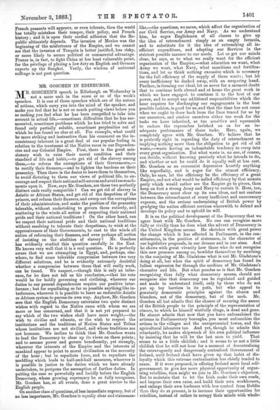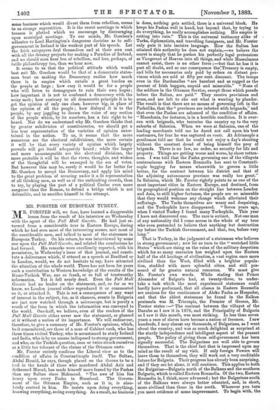MR. GOSCHEN IN EDINBURGH.
MR. GOSCHEN'S speech in Edinburgh on Wednesday is not a mere unit in the score or so of the week's speeches. It is one of those speeches which are of the nature of actions, which carry you into the mind of the speaker, and make you feel that he is not so much putting views before you as making you feel what he has been compelled to take into account in actual life,—sometimes difficulties that he has sur- mounted, sometimes problems which he has tried to solve and found only partially soluble, sometimes perplexities out of which he has found no clue at all. For example, what could be more striking and instructive than his comment on the in- consistency inherent in a great deal of our popular feeling in relation to the treatment of the Native races in our Dependen- cies and our Colonial Empire. First, there is the great mis- sionary wish to raise their moral condition and their standard of life and habit,—to get rid of the slavery among them,—to reform the corruptions of their Goverments,— to rectify their finances,—and to lighten the burdens on their peasantry. Then there is the desire to leave them to themselves, to avoid dictating to them our views of political life, to en- courage and respect their national self-esteem and avoid encroach- ments upon it. Now, says Mr. Goschen, are these two perfectly distinct ends really compatible I Can we get rid of slavery in Asiatic or African States, and get rid of the despotism of the princes, and reform their finances, and sweep out the corruptions of their administration, and make the position of the peasantry tolerable, without undertaking to govern them entirely, and scattering to the winds all notion of respecting their national pride and their national traditions ? On the other hand, can we respect their national pride and their national traditions without resolving to tolerate their despotisms, to wink at the oppressiveness of their Governments, to cast to the winds all notion of reforming their finances, and even perhaps all notion of insisting on the abolition of slavery ? Mr. Goschen has evidently studied this question carefully in the East. He knows very well that it is a real question. He is perfectly aware that we are attempting in Egypt, and, perhaps, else- where, to find some tolerable compromise between two very different solutions, and he is evidently extremely doubtful whether a compromise between them that will really work, can be found. We suspect,—though this is only an infer- ence, for he does not tell us his conclusion,—that his vote would be for boldly governing and civilising, wherever our duties to our present dependencies require our positive inter- ference ; but for repudiating as far as possible anything like in- terference, wherever it is possible to leave an endurable Asiatic or African system to pursue its own way. Anyhow, Mr. Goschen sees that the English Democracy entertains two quite distinct wishes with regard to the Native races with whom we are more or less concerned, and that it is not yet prepared to say which of the two wishes shall have most weight,--the wish to civilise and educate, or the wish to respect the institutions and the traditions of Native States and Tribes whose institutions are not civilised, and whose traditions are not humane. We incline to think that Mr. Goschen wants to lead the Democracy to clear up its views on these points ; and to assume power and govern beneficently, yet strongly, wherever the interests of the Empire and the interests of mankind appear to point to moral civilisation as the necessity of the hour ; but to repudiate force, and to repudiate the meddling which leads to half-and-half measures, wherever it is possible in justice to the duties which we have already undertaken, to postpone the assumption of further duties. In putting the case so powerfully and lucidly before the English Democracy, whose growing supremacy he so fully recognises, Mr. Goschen has, at all events, done a great service to the English people.
On another class of questions, of less immediate urgency, but of no less importance, Mr. Goschen is equally clear and statesman- like,—the questions, we mean, which affect the organisation of our Civil Service, our Army and Navy. As we understand him, he urges Englishmen of all classes to give up the idea of retrenchment simply as an empty formula, and to substitute for it the idea of retrenching all in- efficient expenditure, and adapting our Services in the- strictest possible manner to our needs. Let us get our minds clear, he says, as to what we really want for the efficient organisation of the Empire,—what education we want, what Army we want, what Navy, what munitions and fortifica- tions, and let us think nothing excessive which is necessary for the full efficiency of the supply of these wants ; but let every inefficiency be docked away, with an unsparing hand. Further, in forming our ideal, let us never for a moment doubt that to continue both abroad and at home the great work in which we have engaged, to continue it to the best of our power, and to accept any additional responsibilities which the hour requires for discharging our engagements in the best possible fashion, is good for us, and that the time has not come when we ought to draw back from the lines traced for us by our ancestors, and confess ourselves either too weak for the tasks we have inherited, or too sensitive and squeamish to endure the reproaches lavished on us for an in- adequate performance of those tasks. Here, again, we completely agree with Mr. Goschen. We believe that he is perfectly right in regarding the duty of retrenchment as implying nothing more than the obligation to get rid of all waste,—waste having an indomitable tendency to creep into every great organisation. But what waste is, no one, of course, can decide, without knowing precisely what he intends to do, and whether or not he could do it equally well at less cost. Mr. Goschen as an economist deprecates heartily anything like superfluity, and is eager for the utmost efficiency. Only, he says, let the efficiency be the efficiency of a great Empire, and not what would be called efficiency by that minute party which would rather see the Empire go to pieces, than keep on foot a strong Army and Navy to sustain it. Here, too, the Democracy must clear up its own ideas, and not confuse between the retrenchment of every inefficient and unnecessary expense, and the serious undermining of British power by grudging the nation efficient services wherewith to defend and develope its policy and to uphold its will.
It is on the political development of the Democracy that we agree least with Mr. Goschen. No one can recognise more fully or vividly than he does what the advent of Democracy in the United Kingdom means. He sketches with great power the change which it has effected in Parliament, in the con- stituencies, in the position of statesmen, in the character of our legislative proposals, in our dreams and in our aims. And he shows with great vivacity how those who do not recognise this new presence among us, bewilder themselves by ascribing to the conjuring of Mr. Gladstone what is not Mr. Gladstone's doing at all, but what the spirit of democracy has found its fullest expression for through the medium of Mr. Gladstone's character and life. But what puzzles us is that Mr. Goschen recognising thus fully what democracy means, should not recognise also that democracy can be regulated and guided. and made to understand itself, only by those who do not put up toy barriers in its path, but who appeal to genuinely democratic principles against the abuses and blunders, not of the democracy, but of the mob. Mr.
Goschen all but admits that the chance of securing the assent of the British people to the principle of the representation of classes, to which he himself wistfully clings, is dead and gone.
He almost admits that now that you have enfranchised the artisans in Parliamentary boroughs, you must enfranchise the artisan in the villages and the unrepresented towns, and the agricultural labourers too. And yet, though he admits this reluctantly, he makes shipwreck of his own political influence by insisting that he will be the last man to yield. That seems to us a little childish; and it seems to us not a little childish that he will not hear for a moment of decentralising the extravagantly and dangerously centralised Government of Ireland, until Ireland shall have given up that habit of dis- loyalty which this extreme centralisation has chiefly tended to cause. If it were proposed, in offering Ireland more local self- government, to give her more physical opportunity of organ- ising rebellion, then might we join in Mr. Goschen 's objection. But to maintain that to let the Irish make their own roads, and impose their own rates, and build their own workhouses, and enlarge their own harbours with less control from Dublin than they do at present, is to increase their opportunities for rebellion, instead of rather to occupy their minds with whole- some business which would divert them from rebellion, seems to us strange superstition. It is the secret meetings in which treason is plotted which we encourage by discouraging open municipal meetings. To our minds, Mr. Goschen's adhesion to Lord Hartington's dangerous doctrine as to self- government in Ireland is the weakest part of his speech. Let the Irish ratepayers deal themselves and at their own cost with all the dreamy projects for making a Paradise of Ireland, and we should soon hear less of rebellion, and less, perhaps, of futile philanthropy too, than we hear now. It seems to us that the political attitude which would best suit Mr. Goschen would be that of a democratic states- man bent on making the Democracy realise how much there is in empire which entails a great burden on the people at large ; how easy it would be for a people who will listen to demagogues to ruin their own hopes ; how important it is not to confound a democracy with the noisy mob ; how contrary to all democratic principle it is to get the opinion of only one class, however big, in place of the opinion of all the people ; how disloyal it is to the people, by any juggling to drown the voice of any section of the people which, by its numbers, has a fair right to be heard. Nor do we understand why Mr. Goschen thinks that by greater subdivision of constituencies, we should get a less true representation of the varieties of opinion enter- tained in the nation. To us, it seems that the more numerous are the electoral subdivisions, the more certain it will be that every variety of opinion which largely prevails will get itself adequately heard ; while the larger and more unmanageable are the electoral divisions, the more probable it will be that the views, thoughts, and wishes of the thoughtful will be swamped in the sea of votes. But however this may be, surely it would be far better for Mr. Goschen to accept the Democracy, and apply his mind to the great problem of securing under it a fit representation of all thinking men, as well as of the unthinking crowds, than to try, by playing the part of a political Codes even more .sanguine than the Roman, to defend a bridge which is not defensible, and to sacrifice himself in the attempt.







































 Previous page
Previous page